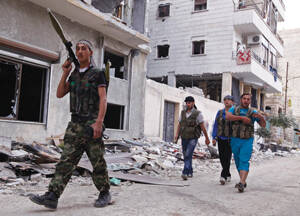As the suffering of ordinary Syrians and the slow destruction of Aleppo, Damascus and other communities rich in religious expression and historic and cultural value continues, why can the United States and the world community not do more to end Syria’s civil war? George Lopez, a professor at the University of Notre Dame’s Kroc Institute for International Peace Studies, says the United States and United Nations have few good options for a speedy resolution to the crisis.
The Obama administration has been criticized for resisting the equipping of the Syrian opposition with what they need to neutralize the Syrian army’s advantages in aircraft and heavy weapons. Some argue that this policy will only delay the inevitable fall of the Bashar al-Assad regime and will prolong a grinding struggle that is taking thousands of lives. Lopez points out, however, that “once you arm the Syrians on the ground, you unleash forces that you can’t control.” He adds that the administration is not worried just about the possible flow of sophisticated weapons to Al Qaeda elements working alongside the native opposition groups, but also about a redline drawn months ago by the regime: that it would resort to chemical weapons if outsiders intervened to arm the resistance. That outcome could escalate the civilian toll far beyond its current measure.
Lopez does not expect much to change on the ground in Syria until after the elections in the United States on Nov. 6. Right now, he says, the Obama administration faces a complex situation—will Turkey, a NATO member, draw that alliance into the struggle? Will the Kurdish minority see the chaos as an opportunity to strike for statehood?—and few easy choices. And whatever moves it does make are subject to acute scrutiny during the election season.
Lopez thinks that means the status quo of stalemate and suffering will continue. His says the United States may be ready to undertake several meaningful initiatives to end the crisis once bipartisan resolve can rematerialize in Washington. Lopez thinks humanitarian aid could be delivered and sanctions stepped up against the al-Assad regime, and perhaps a liberated zone could be established to deliver aid and extract refugees safely. He expects that the Obama administration will make further efforts to coordinate these multilateral moves through the United Nations but that a Russian veto on the Security Council is almost a certainty.
That prospect, he suspects, may be behind the intelligence sharing with Turkey that led to the forced landing of a Syrian passenger jet and the discovery of Russian radar equipment on Oct. 10. While technically not illegal, since Russia has repeatedly squashed tough sanctions against Assad, a U.S. spokesperson called Russia’s attempt to re-equip the regime “morally bankrupt.” A clear demonstration of Russian involvement with the Assad regime and its unwillingness to allow the United Nations to use its authority to intervene could allow the United States and its European allies to work around the United Nations. They could begin their own efforts on behalf of the Syrian opposition, according to Lopez. He cites the Clinton administration’s decision to commit U.S. air power to the intervention in Kosovo when it was clear that Russian intransigence was crippling a U.N. response.
“They will eventually just go around the Security Council,” he said. “They will want to go back one more time and get a visible ‘no’ from the Russians, so [the United States] can say, ‘Just as in Kosovo, you gave us no choice.’” Lopez said U.S. diplomats will also press the opposition to come up with a viable, comprehensive plan for a post-Assad Syria that will include protection of minority religious and ethnic rights. Meanwhile the fighting and dying will continue. “Sometimes civil wars just have to play themselves out,” Lopez said.








